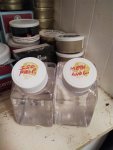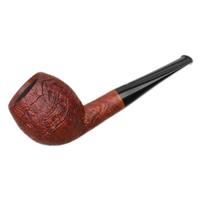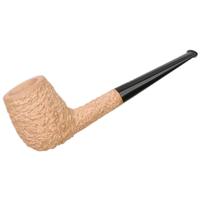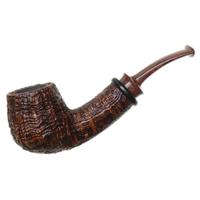Removing the crud that carry the bugs is one key, so water, dish detergent, and perhaps alcohol at some concentration, plus physical friction might all help. Additional studies might add more information ... but that's what all scientists say.
Article Stating That 70% Isopropyl Alcohol is a Better Disinfectant than 99%
- Thread starter Bowie
- Start date
You are using an out of date browser. It may not display this or other websites correctly.
You should upgrade or use an alternative browser.
You should upgrade or use an alternative browser.
- Status
- Not open for further replies.
A hot water flush achieves the same level of bacteria removal, as well as being cheaper and more convenient than alcohol, which use may impact the briar itself.
And soggy dottle? Any dottle should be removed fairly soon, but if you dry your tobacco, you won't have a soggy bottom. I gore-an-tee it.
Think about what doctors do to ensure they don’t contaminate a sterile environment. A hot water flush will encourage bacterial growth as much as anything, unless you’re actually going to boil your pipe for ten minutes.
At this point I Just have to lament how sad western society can be sometimes.
Alcohol shouldn’t be expensive at all. We can burn Ethanol for mass transportation but heaven forbid the common person have any other use for it.
If I were to use alcohol, I'd use Everclear, which you can also drink.
But unless your pipe is ghosted, why use it at all?
But unless your pipe is ghosted, why use it at all?
Whichever is cheaper, it all works the same on your pipe.Any thoughts on 190 proof grain alcohol as opposed to the Isopropyl being discussed?
Those of restoring estate pipes may find this information interesting. I'm not posting this to as an argument that 70% is the "correct" way or that using 91%+ is "wrong." I'm not a scientist or in a relevant field and cannot competently comment on the findings in the article, so I simply present it as something of interest. There is also some information about rubbing and denatured alcohol.
Why Is 70% Isopropyl Alcohol (IPA) a Better Disinfectant than 99% Isopropanol, and What Is IPA Used For? - https://blog.gotopac.com/2017/05/15/why-is-70-isopropyl-alcohol-ipa-a-better-disinfectant-than-99-isopropanol-and-what-is-ipa-used-for/
Interesting extracts:
The presence of water is a crucial factor in destroying or inhibiting the growth of pathogenic microorganisms with isopropyl alcohol. Water acts as a catalyst and plays a key role in denaturing the proteins of vegetative cell membranes. 70% IPA solutions penetrate the cell wall more completely which permeates the entire cell, coagulates all proteins, and therefore the microorganism dies.
Solutions > 91% IPA may kill some bacteria, but require longer contact times for disinfection, and enable spores to lie in a dormant state without being killed. A 50% isopropyl alcohol solution kills Staphylococcus Aureus in less than 10 seconds (pg. 238), yet a 90% solution with a contact time of over two hours is ineffective.
Interesting -- didn't know that!
Bill
I used to work in the food industry. Want to know what the FDA considers acceptable in food production??
Just the very existence of the term "filth allowance" should be enough to make anybody edgy!
Not advocating this, but this thread brings to mind the classic George Carlin routine on germs and the immune system. If you can take a few “F” bombs and bathroom humor goggle:
“George Carlin germs” to see the full 6 minutes. I’d post a link but I am pretty sure it is not for general audiences.
Carlin’s approach:
“George Carlin germs” to see the full 6 minutes. I’d post a link but I am pretty sure it is not for general audiences.
Carlin’s approach:
YMMV“When I was a little boy in New York City in the 1940s, we swam in the Hudson River, and it was filled with raw sewage. OK? We swam in raw sewage - you know, to cool off. And at that time, the big fear was polio. Thousands of kids died from polio every year. But you know something? In my neighborhood, no one ever got polio. No one. Ever. You know why? 'Cause we swam in raw sewage.”
not sure he's right about that. Not quite how the immune system works, though swimming in raw sewage might reduce contact with other children, and that might work.Not advocating this, but this thread brings to mind the classic George Carlin routine on germs and the immune system. If you can take a few “F” bombs and bathroom humor goggle:
“George Carlin germs” to see the full 6 minutes. I’d post a link but I am pretty sure it is not for general audiences.
Carlin’s approach:
YMMV
I am dealing with estate pipes and the concern is about previous smokers and the issue of God knows what I could be exposed to.
I soak stems in Oxyclean and then pipe cleaners in vodka. (Can’t get Everclear is BC) if the bowl is bad I use the salt treatment but I don’t believe this is a disinfectant as much as an oil,gunk remover. The bowl gets a heavy vodka pipe cleaner treatment.
I don’t know if disease organisms survive in old tar.
I soak stems in Oxyclean and then pipe cleaners in vodka. (Can’t get Everclear is BC) if the bowl is bad I use the salt treatment but I don’t believe this is a disinfectant as much as an oil,gunk remover. The bowl gets a heavy vodka pipe cleaner treatment.
I don’t know if disease organisms survive in old tar.
I remember being told in a First Aid training class that wine was way better to use in sterilizing a wound than a liquor. I don't remember why, but that has stuck with me for decades. Fortunately, I have never had to pour a Chardonnay on someone's open wound.
I amazed that some of you guys find the courage to put a pipe in your mouth with all the concerns and phobias over germs and stuff.
I'd be interested to hear chemists discuss the 70% versus 90% difference in cleaning or sterilizing properties. Some chemical reactions and interaction are counter-intuitive, and it isn't always "more is better." And sometimes the reason for that is fairly simple to understand. In my case, simple to understand is good. It would be interesting to hear the discussion. Any chemists want to weigh in?
I'm still a newbie (18 months) and it was about a year before I would even consider smoking an estate pipe. Now, I have a couple that I smoke.I amazed that some of you guys find the courage to put a pipe in your mouth with all the concerns and phobias over germs and stuff.
And yes, I frequent bars/restaurants and use silverware, glasses and cups.
I'm a scientist. A very very dirty 50s Charatan consumed all of my alcohol while cleaning yesterday. I made a point to stock up on my pipe cleaning supplies in lab today. A half-liter of pure methanol and a half-liter of isopropanol, each pure 100%.
A chemist will tell you, strictly speaking, that cleaning a pipe is a question of the appropriate solvents. It's all 'chromatography' in a sense, i.e. the leaching of various materials in the appropriate solvent. Tars and gunk (generically speaking) are materials of various molecular weights and solubilities and they leach out to varying degrees in the appropriate solvents.
Smoking from a properly-dried pipe that was cleaned with isopropanol (rubbing alcohol) or methanol (wood alcohol) is less dangerous, and represents less exposure than cleaning a wound with an alcohol (isopropanol) wipe or touching wood alcohol while finishing up a countertop after sanding.
I mentioned earlier: gunk and germs are two different things. I think most of us are cleaning pipes. Nobody I know has ever caught a disease from a pipe, or even a toilet seat for that matter. Nevertheless, appropriately cleaning a pipe will almost entirely sanitize that pipe.
I'll close by saying that alcohols are safe for cleaning pipes, and disinfecting them if you're in need of that particular reassurance, however you should be sure that they are properly dried after a few hours, and you should be absolutely sure if you use Ethanol that it does NOT contain the bittering agent denatonium (read the ingredients; if in doubt, don't use). Furthermore these following solvents are not recommended: acetone (unless you're completely stripping your briar; it may damage your stem and remove any paint thereon), chloroform, heptane, hexane, pentane, toluene, or xylene. Pure chemicals marked 1-Propanol and 2-Propanol are acceptable, and in fact 2-Propanol is iso-Propanol. Obviously do not use kerosene or gasoline.

A chemist will tell you, strictly speaking, that cleaning a pipe is a question of the appropriate solvents. It's all 'chromatography' in a sense, i.e. the leaching of various materials in the appropriate solvent. Tars and gunk (generically speaking) are materials of various molecular weights and solubilities and they leach out to varying degrees in the appropriate solvents.
Smoking from a properly-dried pipe that was cleaned with isopropanol (rubbing alcohol) or methanol (wood alcohol) is less dangerous, and represents less exposure than cleaning a wound with an alcohol (isopropanol) wipe or touching wood alcohol while finishing up a countertop after sanding.
I mentioned earlier: gunk and germs are two different things. I think most of us are cleaning pipes. Nobody I know has ever caught a disease from a pipe, or even a toilet seat for that matter. Nevertheless, appropriately cleaning a pipe will almost entirely sanitize that pipe.
I'll close by saying that alcohols are safe for cleaning pipes, and disinfecting them if you're in need of that particular reassurance, however you should be sure that they are properly dried after a few hours, and you should be absolutely sure if you use Ethanol that it does NOT contain the bittering agent denatonium (read the ingredients; if in doubt, don't use). Furthermore these following solvents are not recommended: acetone (unless you're completely stripping your briar; it may damage your stem and remove any paint thereon), chloroform, heptane, hexane, pentane, toluene, or xylene. Pure chemicals marked 1-Propanol and 2-Propanol are acceptable, and in fact 2-Propanol is iso-Propanol. Obviously do not use kerosene or gasoline.

The answer is that 90% (or 100%) is better for physical-chemical cleaning (if what you're cleaning is "tars"; if it's something water soluble then water is what will clean it); the reason that 70% alcohol is a better disinfectant is that alcohol isn't water, it's actually a "short fat" (properly said, an aliphatic compound). Although alcohol is water-soluble, it isn't itself similar to water, and so it isn't particularly efficient at entering cells (the cells of germs) like water is, and when it's pure it has many non-water properties. When alcohols are combined with water, hydrogen bonding between the alcohol and the water disrupt these intrinsic qualities of the alcohol and allow it to pass more efficiently into cells.I'd be interested to hear chemists discuss the 70% versus 90% difference in cleaning or sterilizing properties. Some chemical reactions and interaction are counter-intuitive, and it isn't always "more is better." And sometimes the reason for that is fairly simple to understand. In my case, simple to understand is good. It would be interesting to hear the discussion. Any chemists want to weigh in?
Thanks for the explanations above.
There's no need to use alcohol at all for 90% of all pipe cleaning jobs. And there's a reason to avoid it altogether: It leaches out some of the minerals that give briar its very properties of strength and fire resistance.
As to virii and bacteria, they will die on any surface within a few days, so best not light up an estate pipe right away. If it's your own germs, so what?
There's no need to use alcohol at all for 90% of all pipe cleaning jobs. And there's a reason to avoid it altogether: It leaches out some of the minerals that give briar its very properties of strength and fire resistance.
As to virii and bacteria, they will die on any surface within a few days, so best not light up an estate pipe right away. If it's your own germs, so what?
As much as I can. As a matter of fact, I have what I call a Pilate Complex: I wash my hands dozens of times a day.
Oh! That explains your cob cleaning (that other thread). As someone with genuine OCD (I’m a ‘checking’ model), I understand.
My most sincere apologies, Olkofri! I was genuinely “taking the pi$$,” (joking) but now I realize I might have been quite offensive.
/cheers
- Status
- Not open for further replies.











